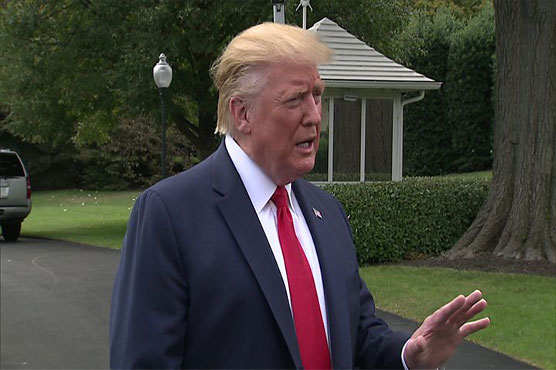Trump says Afghanistan peace talks with Taliban are 'dead'

Trump said that a US military onslaught on the guerrillas was back up at its fiercest in a decade.
WASHINGTON (AFP) - President Donald Trump on Monday said that US peace talks with the Taliban are "dead" and that he is ramping the war back up after canceling secret talks with the Afghan insurgents at his weekend retreat.
"They are dead. As far as I am concerned, they are dead," Trump said at the White House about the long-running attempt to reach an agreement with the Taliban and extricate US troops following 18 years of war.
The announcement followed Trump s dramatic cancelation of a top-secret plan to fly Taliban leaders in for direct talks at the Camp David presidential facility outside Washington.
Driving another nail into the coffin of what had appeared to be nearly finalized negotiations, Trump said that a US military onslaught on the guerrillas was back up at its fiercest in a decade.
"Over the last four days, we have been hitting our Enemy harder than at any time in the last ten years!" he wrote in a tweet.
On Sunday, Secretary of State Mike Pompeo said that "we ve killed over a thousand Taliban in just the last 10 days."
Trump angrily denied that the whiplash effect of his sudden shifts on Afghanistan was causing turmoil.
Until this weekend, there had been steadily mounting expectations of a deal that would see the United States draw down troop levels in Afghanistan. In return, the Taliban would offer security guarantees to keep extremist groups out.
But then on Saturday, Trump revealed that he had canceled an unprecedented meeting between the Taliban and himself at storied Camp David.
He said this was in retaliation for the killing of a US soldier by the Taliban in a huge Kabul bomb blast last week.
The cancelation -- announced on Twitter -- was the first time most Americans learned that such a dramatic meeting was even planned.
Many in Washington were shocked and some were angry that the Taliban had been on the point of visiting the presidential retreat on the eve of the anniversary of the September 11 terrorist attacks.
There was also widespread consternation at the characteristically unpredictable manner of Trump s negotiating style.
But Trump denied any discord among government members including Vice President Mike Pence.
In a tweet, he accused journalists of trying "to create the look of turmoil in the White House, of which there is none."
Trump added that he had no second thoughts about his actions.
"In terms of advisers, I took my own advice," he later told reporters.
A big part of Trump s 2016 election victory and subsequent first term in office has been his determination to keep the United States out of what he sees as unnecessary wars in Syria and other mostly Muslim countries.
Despite a fiercely pro-Israeli foreign policy and the presence of hawks like national security adviser John Bolton in his cabinet, he has so far resisted escalating the military standoff with longtime foe Iran.
Getting out of Afghanistan, where US troops have fought a largely fruitless battle for against the Taliban over nearly two decades, was a top priority. It is widely thought that Trump has been pushing for a withdrawal of US troops in time for his 2020 reelection bid.
Trump repeated on Monday that he wanted "to get out by the earliest possible time."
However, whether because of last week s killing of a US soldier, as he says, or due to wider misgivings, that goal now appears in tatters.
"They did a mistake," Trump said of the Taliban s deadly bomb attack.
Several Republican lawmakers concurred with the president s decision on the talks.
"I ve never believed that a deal with the Taliban is either easy or imminent," Senator Marco Rubio said.
Senator Mitt Romney said that "it wouldn t have been my choice to have the Taliban at Camp David" -- an opinion echoed by Senator Ron Johnson, who said he was "glad" the talks were not held there.
"At some point in time if you want peace you have to talk to them, I don t deny that," said Johnson.
"But right now they re murdering too many people."

